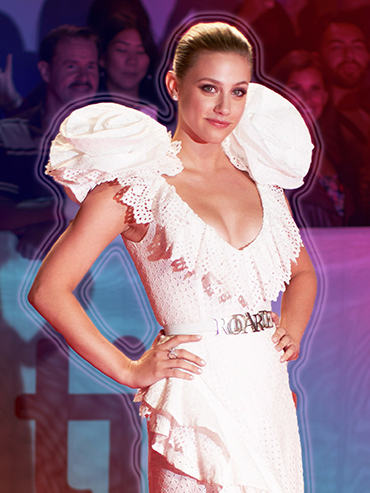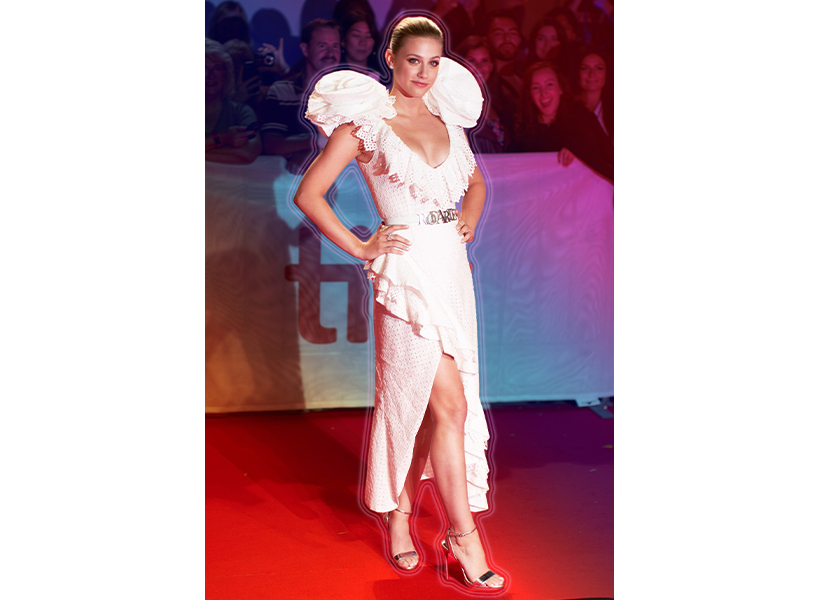Lili Reinhart Has Arrived
The 22-year-old 'Riverdale' actor stars alongside Jennifer Lopez and Lizzo in the season's biggest flick, 'Hustlers,' out September 13


Lili Reinhart first landed on our radar playing the role of Betty Cooper on the hit CW series, Riverdale. But this year she’s making her big break. And I mean BIG. Starring alongside Jennifer Lopez, Constance Wu, Keke Palmer, Cardi B and Queen Lizzo herself in Hustlers—out this month—Reinhart has officially made it into Hollywood’s upper echelon. That’s no small feat for a 22-year-old from Ohio. But, given the unique pressures faced by young women in Hollywood—the darkest extent of which we are only now hearing about thanks to #TimesUp—it’s especially impressive for Reinhart, who has been refreshingly open about living with anxiety and depression.
The actor, who was in Toronto for the worldwide premiere of Hustlers at TIFF, shared a message to her fans following her red carpet turn:
“Tonight was overwhelming in the best way I could’ve ever imagined,” she said in her Instagram Story. “If you were to tell 16-year-old me, who was horribly depressed and near-suicidal, that at 22 years old I would be in a female-driven movie premiering at TIFF, I would never have believed it. I will never forget the feeling of tonight. Knowing that I am doing exactly what I was meant to be in this beautiful life. I’m so honored to be part of Hustlers. And so blessed to be living the life that I am.”
I had a chance to sit down with Reinhart while she was on Candian soil, and found out more about how she deals with anxiety on set, what it was like to step into a bold new role portraying a stripper, and what she’s taking away from this career-changing experience.
What was the most challenging part about playing Annabelle, a stripper?
Just the act of having to dance in a skimpy dress in front of a guy that I didn’t know was out of my comfort zone. And obviously, to have a camera on me watching that as well, it was just kind of a weird experience. But you kind of have to think of it as a performance and remind yourself that you’re not actually giving them any part of yourself, you’re just kind of putting on a show. And that’s what I was telling myself: I’m just acting. I’m putting on a show, this is a performance, I’m not actually giving any of myself away to these people watching me.
And Lorene [Scafaria, the director] did everything to make the environment comfortable and everyone was so respectful.
Was it easier to get comfortable with the role because of the mostly-female cast and crew?
I was definitely anxious going into it. As someone with social anxiety and as an introvert, walking into a setting with all these powerful women was frightening, but it was just my anxiety getting the best of me, because honestly all the women were wonderful.
When I was on set one day, I was looking through my script, highlighting my parts, and there were certain emotional scenes that I was worried about. I was like, “Oh, God, I have to cry in front of J-Lo?” Which kind of made me nervous.
Emotional scenes are easier for me in the Riverdale environment because I’m comfortable with the people I’m working with and surrounded by. But in brand new environment for Hustlers, I didn’t really know what it was going to be like and if people were going to respect [the process] and make the space to get emotional. But it was actually great, and Lorene gave me all the time I needed to get into that space.
Did you have to do any specific kind of physical training for the role?
I actually half joked to Lorene: “Oh, yeah, I’m gonna need to go to the gym pretty hard,” and she was like, “Nope, I want you just as you are, you’re perfect. I don’t want you to stress about your body in this, we’ll make sure you’re incredibly comfortable, whatever you end up wearing.” And that was really refreshing to hear. Because I can imagine that there’s been a lot of people in a lot of situations where they haven’t been met with such a loving answer. It was really nice to walk into that feeling like you could look literally however you looked and it was good enough.
But I took two [pole dance] classes just for fun. I did a class with Keke [Palmer], and then I went back for an individual one just because of sheer curiosity and it being a great way of working out, honestly. It’s so difficult and requires a lot of abs. It’s honestly so beautiful, I would watch someone fully clothed on a pole dancing all day long because it’s so hypnotizing. It’s truly and art form, but an art form that allows you to take your clothes off, I guess. I think of it as a dance and truly a skill.

How did having a woman director influence the mood on set?
She would always come talk to me and ask if I was comfortable. She was very reassuring, very kind. Everyone just touched base with each other to make sure we’re all good. Luckily, my part didn’t require nudity or anything super uncomfortable, so I was fine. But I’m sure other actresses felt a little bit more [vulnerable]. But Lorene was really wonderful at making sure we were all comfortable just by touching base and checking in on us.
Do you think having this story told through a female lens makes a difference in how it will be received?
I’m 100% sure that if it was made by a man, the women would all look exactly the same. Or have at least exactly the same bodies. So I don’t think this movie would have worked if it were made by man. It’s a realistic [portrayal of] the way that women look today. It’s not all Victoria’s Secret models. You have every race working at the strip club. You have Trace Lysette, who’s a transgender woman. And you have Lizzo, who’s a body-positive woman. I just think from a female perspective, you have much more of a real portrayal of women and real life.
As you get more attention for your work, do you find it more difficult to deal with public scrutiny of things like your personal life?
People are going to find out what they’re going to find out about me, and that’s fine. I feel like I’ve sort of offered myself up to that, just being in a public sphere. And being in a profession that puts you inherently in the spotlight, there’s only so much you can do about that. I’m still finding out what my boundaries are as far as talking about myself and what I want the world to know. And I think if I went back a couple of years, I would maybe be a little bit more private about certain things that maybe I’ve talked about in the past. But it’s sort of a learn as you go.
I guess I’ve come to realize that people are always going to have something to say. And I don’t mind sharing certain things about my life. But I like to keep my relationships private and protect my family. That’s what’s most important.
Has it been difficult to open up about your mental health under that microscope?
You know, I’ve never had a problem talking about my mental health, like, truly, it’s never been a problem for me. But talking about my family and relationships, has been weird because it’s affecting other people. You can talk to me about me and whatever has to do with me, but when it comes my family, and the boyfriend, and the best friends…I just want to protect the people that I love.
How do you balance that public/private divide on social media?
Social media is a great way to fool people into thinking that you’re someone that you’re not. You can create a whole different persona, and be so completely different. And I’ve seen the people present themselves a certain way and when you meet them in person, and you’re like, “Wow, you are nothing like the way you seem.” I want to present myself in the way that when people meet me, they’ll go: “You’re exactly how I thought you would be based off of your social media.”
Related:
‘I Am Not Betty Cooper. You Aren’t Entitled to Me’: Lili Reinhart Demands Fans Respect Her Space
What’s New on Netflix Canada in September
The Endless Frustration of Scarlett Johansson








